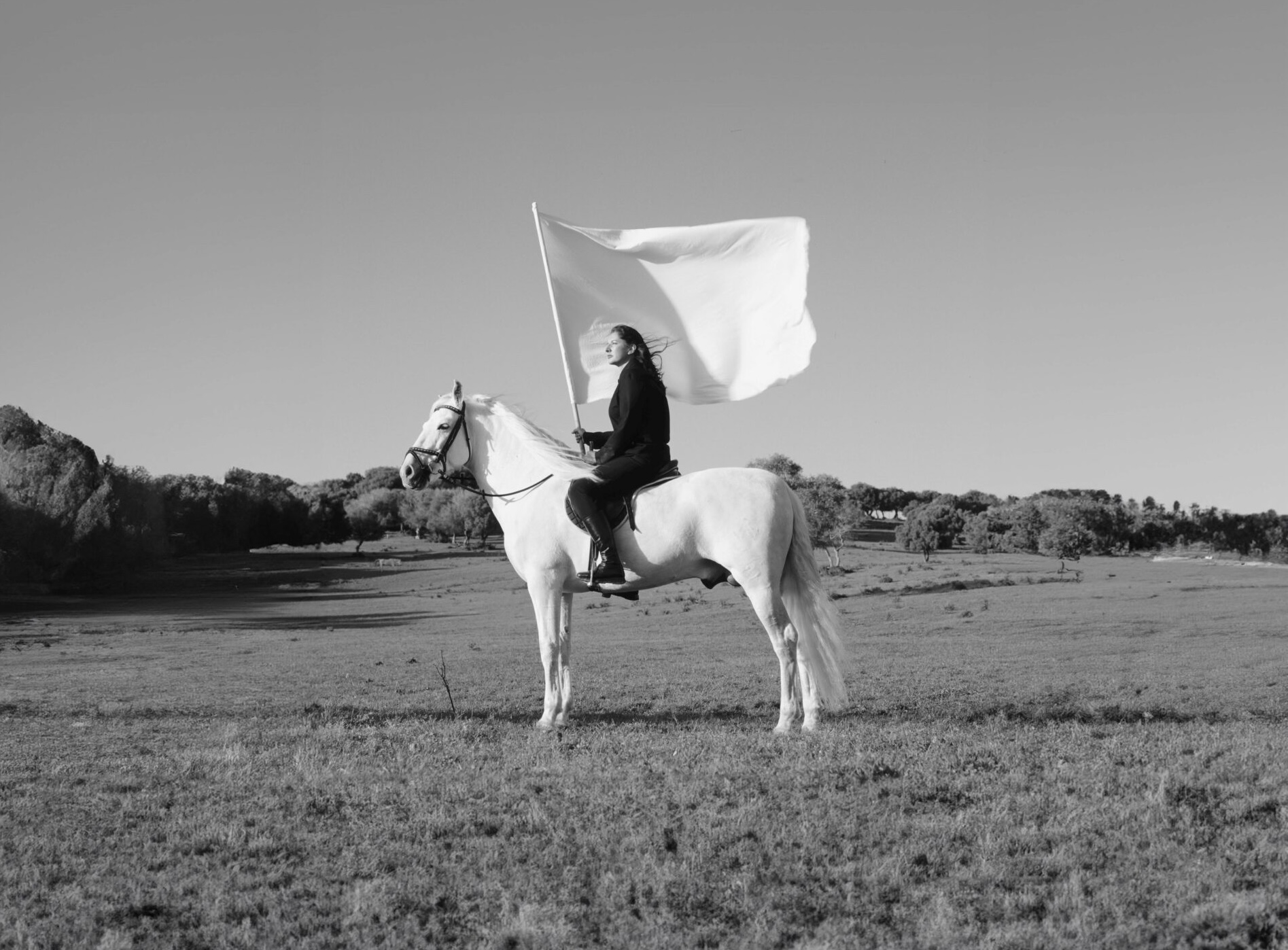

[**VALENTINO**](https://www.valentino.com/en-us) dress.
_New York is full of famous people trying to look like they aren’t famous and not- famous people trying to look like they are, so when Julianne Moore walks into Cafe Cluny in the West Village, it’s instantly obvious that she’s part of the former category._
Dressed in all black—black shoes, black pants, black sweater, black coat, black sunglasses, black hat—she’s the classic archetype of a New Yorker, but with something more to hide than most of us. Like the fact that underneath all that winter gear, she’s Julianne Moore.
Hat and glasses removed, the secret is out. With hair color somewhere between pumpkin and persimmon, and facial features so expressive that talking with her is as if one of those _How Are You Feeling Today?_ posters came to life, she’s a vital force, even at nine in the morning, and even though she’s done enough interviews to last two lifetimes. When I ask if she finds the experience of being profiled stressful, her face contorts from steady and serious to open and reflective until at last she lands on theatrical exuberance.
“It’s kind of unusual, because nobody’s ever going to get to know you, really, over the course of an interview, even over the course of a few days or a couple weeks. They’re going to form a capsule of you,” she says. (Serious.) What about that several- thousand-word John Lahr _New Yorke_r profile that came out a few years ago? “I mean, _come on_, it’s also enormously flattering to have a long _New Yorker_ profile. It certainly serves my ego.” (Reflective.) On this last line, she unlocks an ear-to-ear smile and holds a hand to her chest, eyes wide and leaning in towards me. “‘Oh, it’s all about _me_!’” (Theatrical and exuberant.)
To engage with Julianne Moore in conversation is to get a real life reminder of the diversity of her talents, for in person, she exhibits a tiny shade of everything. Her strength is in shapeshifting—from indie darling to blockbuster star, siren to cipher, warmth to frost—while rarely having to default to the Hollywood tradition of spackling a star in prosthetics, draping them in period costume, and calling it a day_._ She is so studied that even with the hallmark of her terracotta hair, you lose contact with Julianne Moore the public figure within seconds of seeing her onscreen.


[**RODARTE**](https://www.rodarte.net) dress.
Try, for example, to imagine Julianne Moore playing basketball. Her husband (director Bart Freundlich) and her two children play, and paparazzi shots of Moore courtside at Knicks games indicate that she at least understands the rules of play, but she says she is the only non-athlete in the family. Fine, fine. But what if, by some impossible circumstance, Moore became the Knicks’ star shooting guard? And in the last minute of a championship game against the Celtics, the Knicks were down by one, and Moore walked onto the court as their secret weapon? At first, it would seem impossible that the fifty-eight- year-old, five-foot-three actress—an Oscar-winning Hollywood heavyweight, star of over seventy films and a handful of TV shows, gun control activist, children’s book author, parent, New Yorker, redhead, former soap actress, waitress, and Boston resident—could just course-correct years of flagging energy and missed opportunities.
But you could still see it, right? If Julianne Moore told us she could do something, who are we to say she can’t?
\*\*\*
But first, Gloria. That is, Gloria Bell, the title character of a film by the same name that is Moore’s latest release. Directed by Sebastián Lelio, who originally made the film in Spanish five years prior, _Gloria Bell_ is a story about a middle-aged woman grappling with a recent divorce, two adult children who have flown the coop, an unstimulating office job, and whose internal life is complex but not heroic—all of which is to say it’s the kind of movie rarely greenlit in Hollywood. _The Guardian_ called Moore’s performance “predictably brilliant.” And it is.
She is more muted here than in her performances as, say, Maude Lebowski or Havana Segrand, but she plays the character of a mother who refuses to shrink away (or make herself a shell of empty longing for her children) with finesse. At a nightclub she meets Arnold (John Turturro), another divorcee with two children, and begins a relationship destined for a different kind of loss. “Let’s put a regular woman with an ordinary life at the center of her own story,” Moore says of the film. “Then you can see how dramatic and full it actually is.”
Moore’s best moments in _Gloria Bell_ are those of Gloria alone, uninhibited, and uninterrupted in her own world. In all her fullness, Gloria loudly sings along with the radio as she drives. She goes to nightclubs alone and dances, largely free from the insecurities of a younger woman. She comes into some weed unexpectedly, and smokes it alone and without pretense, because why not? With this, Lelio lets viewers in on a secret: there is more to Gloria, and older women in general, than we allow. We are taught to equate aloneness with loneliness, but Moore’s vivacious performance as Gloria dispels that myth.


[**SAINT LAURENT BY ANTHONY VACCARELLO**](https://www.ysl.com/us) dress.
In Gloria’s life, her children (played by Michael Cera and Caren Pistorius) are a focus rather than a fixation, a subtlety that Moore expresses fully. “As a person with a 21-year-old right now, the thing I can say about being a parent is that it’s so intense. It’s so, so intense for twenty years,” she explains. “But everything you’re doing as a parent is teaching your child to move away from you, and at a certain point, they _really_ start to move away. I think the shock is that they’re so enmeshed, and then it happens really suddenly. And then there’s that fear that you haven’t parented correctly.”
Moore also has a sixteen-year-old daughter, so her nest, at least for the moment, is still half-full. In fact, while filming a remake of _After the Wedding_, Moore’s daughter came on board as a production assistant, and with Moore’s husband directing, the movie became a bit of a family affair. “Usually when I’m at work, I go back to my room and have time to focus on my lines. In this case, Liv would come back and I’d be like, ‘Did you get any lunch? Are you okay? You want to sit down? What’s going on?’ It was just a little fuller than it usually is.” Freundlich was content staying on location in Oyster Bay, New York at the end of the day, but Moore and her daughter would drive to a local hotel to sit and talk, “and watch _The Bachelorette_, which is awesome.”
Parenting sounds like it can be heartbreaking, tragic even, I say. “I wouldn’t say that it’s tragic. The thing that’s great about Gloria, the thing that I love, is that her children have no idea about her inner life. There’s a different relationship between kids and parents,” Moore explains. “Oddly, you might know more about your children’s lives than they would ever know about yours. Then, of course, the person she turns to when she’s in trouble is her own mother. I loved all that kind of layering.” She pauses to think. “I find it intensely emotional, but I don’t think of it as being tragic.”
\*\*\*


[**VALENTINO**](https://www.valentino.com/en-us) dress.
When Moore says something is intensely emotional, you kind of have to believe her. Would you doubt an astronaut saying space is cold? She traffics in the intensely emotional: in the 2014 film _Still Alice_, for which Moore won the Oscar for best actress, she plays a linguistics professor at Columbia who is diagnosed with early onset Alzheimer’s disease. It’s another of Moore’s film roles where, though she is right there—with her same hair and similar style and even same home city and same co-star she’s been partnered with on-screen before—she is so fully a linguistics professor named Alice Howland that Julianne Moore ceases to exist for 101 minutes.
Part of that phenomenon can be attributed to fact that Moore diligently researches for each of her roles. “I’ve always made sure that I knew my lines really well, but I am even more prepared now than I used to be when I started out,” she says. The researching is her favorite part. “Now, I find that I need to know more and more. I want to know things that are really specific.”
When she was growing up, Moore wanted to be a doctor. (“Can you imagine?” she asks. I can.) So for _Still Alice_, spending time with neurologists and surgeons, and taking acuity tests to learn what it’s like to get the initial Alzheimer’s diagnosis, was engrossing for her. “It’s really, really challenging to diagnose somebody. A person will come in and discover that they’re just exhausted and low on sleep or stressed. But there are people who are very good at covering it up, because they’re smart, because they have advanced memory skills. Doctors told me about this woman who came in who was able to pass all these tests, but was physically presenting symptoms with problems of executive function, like stains on her clothes.
“I think sometimes directors might think, ‘You don’t need to know that because this is not exactly about that.’ But I need to know in order to ground it in something that’s true, because I do feel that the audience feels it. It’s that thing when you watch a movie and the language is slightly wrong or a street sign is wrong, and the minute that happens to an audience, they go, ‘This isn’t real.’” Enabling the audience to suspend disbelief is very important for her, she says. “If anything, I’ve gotten more and more deliberate in my preparation.”


[**GIVENCHY**](https://www.givenchy.com/america/en/homepage) dress and tights.
This commitment to research accounts for the ease with which Moore disappears into roles. For _Bel Canto_, an opera singer. In _Boogie Nights_, a maternal porn star. _Magnolia_, a drug- addicted former golddigger. Sarah Palin in _Game Change_, one half of a struggling lesbian relationship in _The Kids Are All Right_. A silent era film star in _Wonderstruck_.Twins in _Suburbicon_and twins in _As The World Turns_. A star-shooting guard for the Knicks.
Along with her iconic roles, Moore has also played minor characters that become surprising cult favorites. One of those is Nancy Donovan, a high school flame of Jack Donaghy, Alec Baldwin’s high-powered (and, in retrospect, Trumpian) character from _30 Rock_. Donovan is defined by the heavy-handedness of her Boston accent, her devotion to the Catholic church, and her whipsmart comebacks. “Nancy Donovan has a core group of fans,” Moore tells me, adding that she loved doing comedy.
In contrast, how does she prepare for a role as a real person like feminist icon Gloria Steinem, who Moore will play in an upcoming Julie Taymor project? What kind of research does that take?
By way of example, she pulls out Steinem’s most recent memoir, _My Life on the Road_, from her big black bag. “I watch a lot of interviews. I listen to stuff,” she says. And she’s been talking with Gloria herself, to try to get her cadence and tone right. “I got to her house for the first time and when she opened the door, I almost started crying. I got really overwhelmed.” What Moore finds admirable about Steinem in particular is that she’s stayed consistent in her message and behavior since she first came on the scene. “Especially with the criticisms and the barbs that have been thrown at her, she never takes the bait. She’s just a major American political and humanist figure. She’s someone that we should all be really, really proud of, and glad to have lived at the same time as.”
When I bring up that Moore is known to play complicated or difficult women, she delivers a wisecrack in the same cadence (though sadly not the same accent) as Nancy Donovan.
“Ah, that’s just something someone put on my Wikipedia page! Somebody wrote that twenty years ago. I hardly think that Nancy Donovan is a difficult woman, right?”


[**VALENTINO**](https://www.valentino.com/en-us) dress and shoes.
I almost push back before I come to the realization that, when you watch enough Julianne Moore movies, your expectation for complexity and depth can sometimes yield a false positive. Nancy Donovan isn’t the same as Gloria Steinem or painfully unhappy housewife Laura Brown (_The Hours_) or passionate, dying lover Sarah Miles (_The End of the Affair_) or unflinching political radical Julian (_Children of Men_)—but she is still wonderfully funny. Isn’t that a kind of depth in its own way? After Donovan returns from the ladies’ room on one _30 Rock_ episode, Donaghy asks her what took her so long. “Ah, the usual ladies’ room nonsense,” she says. “A girl with boyfriend trouble, someone forgot tampons, everybody was bad at science and math. You know the drill.” Pitch perfect delivery in that over-the- top Boston accent.
\*\*\*
Moore is adept at shapeshifting partially because her family moved around a lot when she was young. Her passion for acting came when they settled for a few years in Frankfurt, Germany, where Moore (whose real last name is Smith) attended the Frankfurt American High School. She appeared in a few plays, had a supportive theater teacher, and decided to pursue the acting path post-high school, with her parents’ wary support. She moved to Boston for college, where she was a cocktail waitress at a bar called the Up and Up Lounge on top of the Howard Johnson’s in Kenmore Square. “They hired me as a cocktail waitress when I was a freshman, then I eventually became a bartender, then by the time I was a senior, the funny thing is, they said, ‘If you want to stay on, you can start as a night manager at the hotel.’” (I can imagine it.) Moore laughs at the memory. “I was like, ‘Uhh, I’m going to move to New York and be an actress.’”
The rest is history.
Well, kind of.


[**GIVENCHY**](https://www.givenchy.com/america/en/homepage) dress.
There are dozens of feature stories on Julianne Moore that you can pick up and read to learn the broad strokes of Moore’s life, her earlier challenges and her perseverance, her first big break and her first big disappointment. Not that it’s not all fascinating—it is—but Moore is forward-moving. What happened then matters, of course, but what’s happening now matters much more.
“For me, I just don’t look back,” she says when I ask if she thinks about past roles in order to influence future ones. “I’m only thinking about what I’m working on at the time and then when that’s over, I’m worried about whether or not I’m going to get another job. When I do see things from a while back, I’m like, ‘What the hell were you doing?’” She even gets surprised when she hears how many movies she’s done. “It’s almost like the things that happened \[before\] just don’t exist to me.”
That doesn’t change the fact that we’re all interested in her—past, present, _and_ future. If we’re all reading about Julianne Moore, who does Julianne Moore read about?
Ideally, head of the Special Counsel investigation of Russian interference in the 2016 election, Robert Mueller. Not who I thought she was going to say. “He has not uttered a word publicly since he started this investigation,” she says, and for a brief second, I wonder if she could pull off playing Mueller in a movie. I can imagine it. “In a world where people are constantly speaking and uttering statements on Twitter and on Instagram, here is this central, incredibly enigmatic figure who is hopefully accomplishing something major and he has not said a word. That’s something that I think is really, really compelling.”


[**TOM FORD**](https://www.tomford.com) dress and [**CHOPARD**](https://www.chopard.com/intl/) jewelry.
\*\*\*
The Knicks don’t win, by the way. Not for want of trying, of course—with Moore’s appearance, the whole arena was invigorated, the city enraptured, the throngs brimming with feeling. For a long moment, victory felt within reach. But sometimes victory is just not as interesting. What’s so human about glory?
The New York papers described the game the next morning in their typical irreverent way: NOW THAT’S MOORE LIKE IT and THE KNICKS ARE ALL RIGHT. The less successful free paper appealed to New Yorkers’ misanthropy: THE BIG LEB-OUCH- SKI. Many made sure to pick up a copy of all three, presumably
to stash in closets until the time came to share the story with their great-grandkids. The drama, the intensity, the improbability and simultaneous hyperreality of it all. What a moment. “You had to see her,” they’d say. “She made it look so easy.”
Moore, the morning after the game, woke up as if nothing had happened. Yesterday, she may have been the city’s most unlikely basketball player, but today, she’ll be someone else.
* * *
Photographer: [ioulex](https://www.instagram.com/ioulex/?hl=en).
Stylist: [Danielle Nachmani](https://www.instagram.com/daniellenachmani/?hl=en) at The Wall Group.
Hair: [Serge Normant](https://www.instagram.com/sergenormant/?hl=en) using [Serge Normant Hair Care](http://sergenormant.com/shop-products/) at Statement Artists.
Makeup: [Hung Vanngo](https://www.instagram.com/hungvanngo/?hl=en) at The Wall Group.
Manicure: [Gina Edwards](https://www.instagram.com/ginaedwards_/?hl=en) using [Tom Ford Beauty](https://www.tomford.com/beauty/) at See Management.
Location: [Colony Studios, Brooklyn](http://colonystudiosbk.com/#our-history).
[
sold out
](/store/issue-164)
[Issue 164](/store/issue-164)
$15.95
Outside Cover:
Select Outside Cover CAYETANO FERRERJULIANNE MOOREGARRETT HEDLUNDCOLSON BAKER
CAYETANO FERRER JULIANNE MOORE GARRETT HEDLUND COLSON BAKER
Add To Cart
document.querySelector('.product-block .product-block').classList.add('is-first-product-block');
 
[**VALENTINO**](https://www.valentino.com/en-us) dress.
_New York is full of famous people trying to look like they aren’t famous and not- famous people trying to look like they are, so when Julianne Moore walks into Cafe Cluny in the West Village, it’s instantly obvious that she’s part of the former category._
Dressed in all black—black shoes, black pants, black sweater, black coat, black sunglasses, black hat—she’s the classic archetype of a New Yorker, but with something more to hide than most of us. Like the fact that underneath all that winter gear, she’s Julianne Moore.
Hat and glasses removed, the secret is out. With hair color somewhere between pumpkin and persimmon, and facial features so expressive that talking with her is as if one of those _How Are You Feeling Today?_ posters came to life, she’s a vital force, even at nine in the morning, and even though she’s done enough interviews to last two lifetimes. When I ask if she finds the experience of being profiled stressful, her face contorts from steady and serious to open and reflective until at last she lands on theatrical exuberance.
“It’s kind of unusual, because nobody’s ever going to get to know you, really, over the course of an interview, even over the course of a few days or a couple weeks. They’re going to form a capsule of you,” she says. (Serious.) What about that several- thousand-word John Lahr _New Yorke_r profile that came out a few years ago? “I mean, _come on_, it’s also enormously flattering to have a long _New Yorker_ profile. It certainly serves my ego.” (Reflective.) On this last line, she unlocks an ear-to-ear smile and holds a hand to her chest, eyes wide and leaning in towards me. “‘Oh, it’s all about _me_!’” (Theatrical and exuberant.)
To engage with Julianne Moore in conversation is to get a real life reminder of the diversity of her talents, for in person, she exhibits a tiny shade of everything. Her strength is in shapeshifting—from indie darling to blockbuster star, siren to cipher, warmth to frost—while rarely having to default to the Hollywood tradition of spackling a star in prosthetics, draping them in period costume, and calling it a day_._ She is so studied that even with the hallmark of her terracotta hair, you lose contact with Julianne Moore the public figure within seconds of seeing her onscreen.

[**VALENTINO**](https://www.valentino.com/en-us) dress.
_New York is full of famous people trying to look like they aren’t famous and not- famous people trying to look like they are, so when Julianne Moore walks into Cafe Cluny in the West Village, it’s instantly obvious that she’s part of the former category._
Dressed in all black—black shoes, black pants, black sweater, black coat, black sunglasses, black hat—she’s the classic archetype of a New Yorker, but with something more to hide than most of us. Like the fact that underneath all that winter gear, she’s Julianne Moore.
Hat and glasses removed, the secret is out. With hair color somewhere between pumpkin and persimmon, and facial features so expressive that talking with her is as if one of those _How Are You Feeling Today?_ posters came to life, she’s a vital force, even at nine in the morning, and even though she’s done enough interviews to last two lifetimes. When I ask if she finds the experience of being profiled stressful, her face contorts from steady and serious to open and reflective until at last she lands on theatrical exuberance.
“It’s kind of unusual, because nobody’s ever going to get to know you, really, over the course of an interview, even over the course of a few days or a couple weeks. They’re going to form a capsule of you,” she says. (Serious.) What about that several- thousand-word John Lahr _New Yorke_r profile that came out a few years ago? “I mean, _come on_, it’s also enormously flattering to have a long _New Yorker_ profile. It certainly serves my ego.” (Reflective.) On this last line, she unlocks an ear-to-ear smile and holds a hand to her chest, eyes wide and leaning in towards me. “‘Oh, it’s all about _me_!’” (Theatrical and exuberant.)
To engage with Julianne Moore in conversation is to get a real life reminder of the diversity of her talents, for in person, she exhibits a tiny shade of everything. Her strength is in shapeshifting—from indie darling to blockbuster star, siren to cipher, warmth to frost—while rarely having to default to the Hollywood tradition of spackling a star in prosthetics, draping them in period costume, and calling it a day_._ She is so studied that even with the hallmark of her terracotta hair, you lose contact with Julianne Moore the public figure within seconds of seeing her onscreen.
 
[**RODARTE**](https://www.rodarte.net) dress.
Try, for example, to imagine Julianne Moore playing basketball. Her husband (director Bart Freundlich) and her two children play, and paparazzi shots of Moore courtside at Knicks games indicate that she at least understands the rules of play, but she says she is the only non-athlete in the family. Fine, fine. But what if, by some impossible circumstance, Moore became the Knicks’ star shooting guard? And in the last minute of a championship game against the Celtics, the Knicks were down by one, and Moore walked onto the court as their secret weapon? At first, it would seem impossible that the fifty-eight- year-old, five-foot-three actress—an Oscar-winning Hollywood heavyweight, star of over seventy films and a handful of TV shows, gun control activist, children’s book author, parent, New Yorker, redhead, former soap actress, waitress, and Boston resident—could just course-correct years of flagging energy and missed opportunities.
But you could still see it, right? If Julianne Moore told us she could do something, who are we to say she can’t?
\*\*\*
But first, Gloria. That is, Gloria Bell, the title character of a film by the same name that is Moore’s latest release. Directed by Sebastián Lelio, who originally made the film in Spanish five years prior, _Gloria Bell_ is a story about a middle-aged woman grappling with a recent divorce, two adult children who have flown the coop, an unstimulating office job, and whose internal life is complex but not heroic—all of which is to say it’s the kind of movie rarely greenlit in Hollywood. _The Guardian_ called Moore’s performance “predictably brilliant.” And it is.
She is more muted here than in her performances as, say, Maude Lebowski or Havana Segrand, but she plays the character of a mother who refuses to shrink away (or make herself a shell of empty longing for her children) with finesse. At a nightclub she meets Arnold (John Turturro), another divorcee with two children, and begins a relationship destined for a different kind of loss. “Let’s put a regular woman with an ordinary life at the center of her own story,” Moore says of the film. “Then you can see how dramatic and full it actually is.”
Moore’s best moments in _Gloria Bell_ are those of Gloria alone, uninhibited, and uninterrupted in her own world. In all her fullness, Gloria loudly sings along with the radio as she drives. She goes to nightclubs alone and dances, largely free from the insecurities of a younger woman. She comes into some weed unexpectedly, and smokes it alone and without pretense, because why not? With this, Lelio lets viewers in on a secret: there is more to Gloria, and older women in general, than we allow. We are taught to equate aloneness with loneliness, but Moore’s vivacious performance as Gloria dispels that myth.

[**RODARTE**](https://www.rodarte.net) dress.
Try, for example, to imagine Julianne Moore playing basketball. Her husband (director Bart Freundlich) and her two children play, and paparazzi shots of Moore courtside at Knicks games indicate that she at least understands the rules of play, but she says she is the only non-athlete in the family. Fine, fine. But what if, by some impossible circumstance, Moore became the Knicks’ star shooting guard? And in the last minute of a championship game against the Celtics, the Knicks were down by one, and Moore walked onto the court as their secret weapon? At first, it would seem impossible that the fifty-eight- year-old, five-foot-three actress—an Oscar-winning Hollywood heavyweight, star of over seventy films and a handful of TV shows, gun control activist, children’s book author, parent, New Yorker, redhead, former soap actress, waitress, and Boston resident—could just course-correct years of flagging energy and missed opportunities.
But you could still see it, right? If Julianne Moore told us she could do something, who are we to say she can’t?
\*\*\*
But first, Gloria. That is, Gloria Bell, the title character of a film by the same name that is Moore’s latest release. Directed by Sebastián Lelio, who originally made the film in Spanish five years prior, _Gloria Bell_ is a story about a middle-aged woman grappling with a recent divorce, two adult children who have flown the coop, an unstimulating office job, and whose internal life is complex but not heroic—all of which is to say it’s the kind of movie rarely greenlit in Hollywood. _The Guardian_ called Moore’s performance “predictably brilliant.” And it is.
She is more muted here than in her performances as, say, Maude Lebowski or Havana Segrand, but she plays the character of a mother who refuses to shrink away (or make herself a shell of empty longing for her children) with finesse. At a nightclub she meets Arnold (John Turturro), another divorcee with two children, and begins a relationship destined for a different kind of loss. “Let’s put a regular woman with an ordinary life at the center of her own story,” Moore says of the film. “Then you can see how dramatic and full it actually is.”
Moore’s best moments in _Gloria Bell_ are those of Gloria alone, uninhibited, and uninterrupted in her own world. In all her fullness, Gloria loudly sings along with the radio as she drives. She goes to nightclubs alone and dances, largely free from the insecurities of a younger woman. She comes into some weed unexpectedly, and smokes it alone and without pretense, because why not? With this, Lelio lets viewers in on a secret: there is more to Gloria, and older women in general, than we allow. We are taught to equate aloneness with loneliness, but Moore’s vivacious performance as Gloria dispels that myth.
 
[**SAINT LAURENT BY ANTHONY VACCARELLO**](https://www.ysl.com/us) dress.
In Gloria’s life, her children (played by Michael Cera and Caren Pistorius) are a focus rather than a fixation, a subtlety that Moore expresses fully. “As a person with a 21-year-old right now, the thing I can say about being a parent is that it’s so intense. It’s so, so intense for twenty years,” she explains. “But everything you’re doing as a parent is teaching your child to move away from you, and at a certain point, they _really_ start to move away. I think the shock is that they’re so enmeshed, and then it happens really suddenly. And then there’s that fear that you haven’t parented correctly.”
Moore also has a sixteen-year-old daughter, so her nest, at least for the moment, is still half-full. In fact, while filming a remake of _After the Wedding_, Moore’s daughter came on board as a production assistant, and with Moore’s husband directing, the movie became a bit of a family affair. “Usually when I’m at work, I go back to my room and have time to focus on my lines. In this case, Liv would come back and I’d be like, ‘Did you get any lunch? Are you okay? You want to sit down? What’s going on?’ It was just a little fuller than it usually is.” Freundlich was content staying on location in Oyster Bay, New York at the end of the day, but Moore and her daughter would drive to a local hotel to sit and talk, “and watch _The Bachelorette_, which is awesome.”
Parenting sounds like it can be heartbreaking, tragic even, I say. “I wouldn’t say that it’s tragic. The thing that’s great about Gloria, the thing that I love, is that her children have no idea about her inner life. There’s a different relationship between kids and parents,” Moore explains. “Oddly, you might know more about your children’s lives than they would ever know about yours. Then, of course, the person she turns to when she’s in trouble is her own mother. I loved all that kind of layering.” She pauses to think. “I find it intensely emotional, but I don’t think of it as being tragic.”
\*\*\*

[**SAINT LAURENT BY ANTHONY VACCARELLO**](https://www.ysl.com/us) dress.
In Gloria’s life, her children (played by Michael Cera and Caren Pistorius) are a focus rather than a fixation, a subtlety that Moore expresses fully. “As a person with a 21-year-old right now, the thing I can say about being a parent is that it’s so intense. It’s so, so intense for twenty years,” she explains. “But everything you’re doing as a parent is teaching your child to move away from you, and at a certain point, they _really_ start to move away. I think the shock is that they’re so enmeshed, and then it happens really suddenly. And then there’s that fear that you haven’t parented correctly.”
Moore also has a sixteen-year-old daughter, so her nest, at least for the moment, is still half-full. In fact, while filming a remake of _After the Wedding_, Moore’s daughter came on board as a production assistant, and with Moore’s husband directing, the movie became a bit of a family affair. “Usually when I’m at work, I go back to my room and have time to focus on my lines. In this case, Liv would come back and I’d be like, ‘Did you get any lunch? Are you okay? You want to sit down? What’s going on?’ It was just a little fuller than it usually is.” Freundlich was content staying on location in Oyster Bay, New York at the end of the day, but Moore and her daughter would drive to a local hotel to sit and talk, “and watch _The Bachelorette_, which is awesome.”
Parenting sounds like it can be heartbreaking, tragic even, I say. “I wouldn’t say that it’s tragic. The thing that’s great about Gloria, the thing that I love, is that her children have no idea about her inner life. There’s a different relationship between kids and parents,” Moore explains. “Oddly, you might know more about your children’s lives than they would ever know about yours. Then, of course, the person she turns to when she’s in trouble is her own mother. I loved all that kind of layering.” She pauses to think. “I find it intensely emotional, but I don’t think of it as being tragic.”
\*\*\*
 
[**VALENTINO**](https://www.valentino.com/en-us) dress.
When Moore says something is intensely emotional, you kind of have to believe her. Would you doubt an astronaut saying space is cold? She traffics in the intensely emotional: in the 2014 film _Still Alice_, for which Moore won the Oscar for best actress, she plays a linguistics professor at Columbia who is diagnosed with early onset Alzheimer’s disease. It’s another of Moore’s film roles where, though she is right there—with her same hair and similar style and even same home city and same co-star she’s been partnered with on-screen before—she is so fully a linguistics professor named Alice Howland that Julianne Moore ceases to exist for 101 minutes.
Part of that phenomenon can be attributed to fact that Moore diligently researches for each of her roles. “I’ve always made sure that I knew my lines really well, but I am even more prepared now than I used to be when I started out,” she says. The researching is her favorite part. “Now, I find that I need to know more and more. I want to know things that are really specific.”
When she was growing up, Moore wanted to be a doctor. (“Can you imagine?” she asks. I can.) So for _Still Alice_, spending time with neurologists and surgeons, and taking acuity tests to learn what it’s like to get the initial Alzheimer’s diagnosis, was engrossing for her. “It’s really, really challenging to diagnose somebody. A person will come in and discover that they’re just exhausted and low on sleep or stressed. But there are people who are very good at covering it up, because they’re smart, because they have advanced memory skills. Doctors told me about this woman who came in who was able to pass all these tests, but was physically presenting symptoms with problems of executive function, like stains on her clothes.
“I think sometimes directors might think, ‘You don’t need to know that because this is not exactly about that.’ But I need to know in order to ground it in something that’s true, because I do feel that the audience feels it. It’s that thing when you watch a movie and the language is slightly wrong or a street sign is wrong, and the minute that happens to an audience, they go, ‘This isn’t real.’” Enabling the audience to suspend disbelief is very important for her, she says. “If anything, I’ve gotten more and more deliberate in my preparation.”

[**VALENTINO**](https://www.valentino.com/en-us) dress.
When Moore says something is intensely emotional, you kind of have to believe her. Would you doubt an astronaut saying space is cold? She traffics in the intensely emotional: in the 2014 film _Still Alice_, for which Moore won the Oscar for best actress, she plays a linguistics professor at Columbia who is diagnosed with early onset Alzheimer’s disease. It’s another of Moore’s film roles where, though she is right there—with her same hair and similar style and even same home city and same co-star she’s been partnered with on-screen before—she is so fully a linguistics professor named Alice Howland that Julianne Moore ceases to exist for 101 minutes.
Part of that phenomenon can be attributed to fact that Moore diligently researches for each of her roles. “I’ve always made sure that I knew my lines really well, but I am even more prepared now than I used to be when I started out,” she says. The researching is her favorite part. “Now, I find that I need to know more and more. I want to know things that are really specific.”
When she was growing up, Moore wanted to be a doctor. (“Can you imagine?” she asks. I can.) So for _Still Alice_, spending time with neurologists and surgeons, and taking acuity tests to learn what it’s like to get the initial Alzheimer’s diagnosis, was engrossing for her. “It’s really, really challenging to diagnose somebody. A person will come in and discover that they’re just exhausted and low on sleep or stressed. But there are people who are very good at covering it up, because they’re smart, because they have advanced memory skills. Doctors told me about this woman who came in who was able to pass all these tests, but was physically presenting symptoms with problems of executive function, like stains on her clothes.
“I think sometimes directors might think, ‘You don’t need to know that because this is not exactly about that.’ But I need to know in order to ground it in something that’s true, because I do feel that the audience feels it. It’s that thing when you watch a movie and the language is slightly wrong or a street sign is wrong, and the minute that happens to an audience, they go, ‘This isn’t real.’” Enabling the audience to suspend disbelief is very important for her, she says. “If anything, I’ve gotten more and more deliberate in my preparation.”
 
[**GIVENCHY**](https://www.givenchy.com/america/en/homepage) dress and tights.
This commitment to research accounts for the ease with which Moore disappears into roles. For _Bel Canto_, an opera singer. In _Boogie Nights_, a maternal porn star. _Magnolia_, a drug- addicted former golddigger. Sarah Palin in _Game Change_, one half of a struggling lesbian relationship in _The Kids Are All Right_. A silent era film star in _Wonderstruck_.Twins in _Suburbicon_and twins in _As The World Turns_. A star-shooting guard for the Knicks.
Along with her iconic roles, Moore has also played minor characters that become surprising cult favorites. One of those is Nancy Donovan, a high school flame of Jack Donaghy, Alec Baldwin’s high-powered (and, in retrospect, Trumpian) character from _30 Rock_. Donovan is defined by the heavy-handedness of her Boston accent, her devotion to the Catholic church, and her whipsmart comebacks. “Nancy Donovan has a core group of fans,” Moore tells me, adding that she loved doing comedy.
In contrast, how does she prepare for a role as a real person like feminist icon Gloria Steinem, who Moore will play in an upcoming Julie Taymor project? What kind of research does that take?
By way of example, she pulls out Steinem’s most recent memoir, _My Life on the Road_, from her big black bag. “I watch a lot of interviews. I listen to stuff,” she says. And she’s been talking with Gloria herself, to try to get her cadence and tone right. “I got to her house for the first time and when she opened the door, I almost started crying. I got really overwhelmed.” What Moore finds admirable about Steinem in particular is that she’s stayed consistent in her message and behavior since she first came on the scene. “Especially with the criticisms and the barbs that have been thrown at her, she never takes the bait. She’s just a major American political and humanist figure. She’s someone that we should all be really, really proud of, and glad to have lived at the same time as.”
When I bring up that Moore is known to play complicated or difficult women, she delivers a wisecrack in the same cadence (though sadly not the same accent) as Nancy Donovan.
“Ah, that’s just something someone put on my Wikipedia page! Somebody wrote that twenty years ago. I hardly think that Nancy Donovan is a difficult woman, right?”

[**GIVENCHY**](https://www.givenchy.com/america/en/homepage) dress and tights.
This commitment to research accounts for the ease with which Moore disappears into roles. For _Bel Canto_, an opera singer. In _Boogie Nights_, a maternal porn star. _Magnolia_, a drug- addicted former golddigger. Sarah Palin in _Game Change_, one half of a struggling lesbian relationship in _The Kids Are All Right_. A silent era film star in _Wonderstruck_.Twins in _Suburbicon_and twins in _As The World Turns_. A star-shooting guard for the Knicks.
Along with her iconic roles, Moore has also played minor characters that become surprising cult favorites. One of those is Nancy Donovan, a high school flame of Jack Donaghy, Alec Baldwin’s high-powered (and, in retrospect, Trumpian) character from _30 Rock_. Donovan is defined by the heavy-handedness of her Boston accent, her devotion to the Catholic church, and her whipsmart comebacks. “Nancy Donovan has a core group of fans,” Moore tells me, adding that she loved doing comedy.
In contrast, how does she prepare for a role as a real person like feminist icon Gloria Steinem, who Moore will play in an upcoming Julie Taymor project? What kind of research does that take?
By way of example, she pulls out Steinem’s most recent memoir, _My Life on the Road_, from her big black bag. “I watch a lot of interviews. I listen to stuff,” she says. And she’s been talking with Gloria herself, to try to get her cadence and tone right. “I got to her house for the first time and when she opened the door, I almost started crying. I got really overwhelmed.” What Moore finds admirable about Steinem in particular is that she’s stayed consistent in her message and behavior since she first came on the scene. “Especially with the criticisms and the barbs that have been thrown at her, she never takes the bait. She’s just a major American political and humanist figure. She’s someone that we should all be really, really proud of, and glad to have lived at the same time as.”
When I bring up that Moore is known to play complicated or difficult women, she delivers a wisecrack in the same cadence (though sadly not the same accent) as Nancy Donovan.
“Ah, that’s just something someone put on my Wikipedia page! Somebody wrote that twenty years ago. I hardly think that Nancy Donovan is a difficult woman, right?”
 
[**VALENTINO**](https://www.valentino.com/en-us) dress and shoes.
I almost push back before I come to the realization that, when you watch enough Julianne Moore movies, your expectation for complexity and depth can sometimes yield a false positive. Nancy Donovan isn’t the same as Gloria Steinem or painfully unhappy housewife Laura Brown (_The Hours_) or passionate, dying lover Sarah Miles (_The End of the Affair_) or unflinching political radical Julian (_Children of Men_)—but she is still wonderfully funny. Isn’t that a kind of depth in its own way? After Donovan returns from the ladies’ room on one _30 Rock_ episode, Donaghy asks her what took her so long. “Ah, the usual ladies’ room nonsense,” she says. “A girl with boyfriend trouble, someone forgot tampons, everybody was bad at science and math. You know the drill.” Pitch perfect delivery in that over-the- top Boston accent.
\*\*\*
Moore is adept at shapeshifting partially because her family moved around a lot when she was young. Her passion for acting came when they settled for a few years in Frankfurt, Germany, where Moore (whose real last name is Smith) attended the Frankfurt American High School. She appeared in a few plays, had a supportive theater teacher, and decided to pursue the acting path post-high school, with her parents’ wary support. She moved to Boston for college, where she was a cocktail waitress at a bar called the Up and Up Lounge on top of the Howard Johnson’s in Kenmore Square. “They hired me as a cocktail waitress when I was a freshman, then I eventually became a bartender, then by the time I was a senior, the funny thing is, they said, ‘If you want to stay on, you can start as a night manager at the hotel.’” (I can imagine it.) Moore laughs at the memory. “I was like, ‘Uhh, I’m going to move to New York and be an actress.’”
The rest is history.
Well, kind of.

[**VALENTINO**](https://www.valentino.com/en-us) dress and shoes.
I almost push back before I come to the realization that, when you watch enough Julianne Moore movies, your expectation for complexity and depth can sometimes yield a false positive. Nancy Donovan isn’t the same as Gloria Steinem or painfully unhappy housewife Laura Brown (_The Hours_) or passionate, dying lover Sarah Miles (_The End of the Affair_) or unflinching political radical Julian (_Children of Men_)—but she is still wonderfully funny. Isn’t that a kind of depth in its own way? After Donovan returns from the ladies’ room on one _30 Rock_ episode, Donaghy asks her what took her so long. “Ah, the usual ladies’ room nonsense,” she says. “A girl with boyfriend trouble, someone forgot tampons, everybody was bad at science and math. You know the drill.” Pitch perfect delivery in that over-the- top Boston accent.
\*\*\*
Moore is adept at shapeshifting partially because her family moved around a lot when she was young. Her passion for acting came when they settled for a few years in Frankfurt, Germany, where Moore (whose real last name is Smith) attended the Frankfurt American High School. She appeared in a few plays, had a supportive theater teacher, and decided to pursue the acting path post-high school, with her parents’ wary support. She moved to Boston for college, where she was a cocktail waitress at a bar called the Up and Up Lounge on top of the Howard Johnson’s in Kenmore Square. “They hired me as a cocktail waitress when I was a freshman, then I eventually became a bartender, then by the time I was a senior, the funny thing is, they said, ‘If you want to stay on, you can start as a night manager at the hotel.’” (I can imagine it.) Moore laughs at the memory. “I was like, ‘Uhh, I’m going to move to New York and be an actress.’”
The rest is history.
Well, kind of.
 
[**GIVENCHY**](https://www.givenchy.com/america/en/homepage) dress.
There are dozens of feature stories on Julianne Moore that you can pick up and read to learn the broad strokes of Moore’s life, her earlier challenges and her perseverance, her first big break and her first big disappointment. Not that it’s not all fascinating—it is—but Moore is forward-moving. What happened then matters, of course, but what’s happening now matters much more.
“For me, I just don’t look back,” she says when I ask if she thinks about past roles in order to influence future ones. “I’m only thinking about what I’m working on at the time and then when that’s over, I’m worried about whether or not I’m going to get another job. When I do see things from a while back, I’m like, ‘What the hell were you doing?’” She even gets surprised when she hears how many movies she’s done. “It’s almost like the things that happened \[before\] just don’t exist to me.”
That doesn’t change the fact that we’re all interested in her—past, present, _and_ future. If we’re all reading about Julianne Moore, who does Julianne Moore read about?
Ideally, head of the Special Counsel investigation of Russian interference in the 2016 election, Robert Mueller. Not who I thought she was going to say. “He has not uttered a word publicly since he started this investigation,” she says, and for a brief second, I wonder if she could pull off playing Mueller in a movie. I can imagine it. “In a world where people are constantly speaking and uttering statements on Twitter and on Instagram, here is this central, incredibly enigmatic figure who is hopefully accomplishing something major and he has not said a word. That’s something that I think is really, really compelling.”

[**GIVENCHY**](https://www.givenchy.com/america/en/homepage) dress.
There are dozens of feature stories on Julianne Moore that you can pick up and read to learn the broad strokes of Moore’s life, her earlier challenges and her perseverance, her first big break and her first big disappointment. Not that it’s not all fascinating—it is—but Moore is forward-moving. What happened then matters, of course, but what’s happening now matters much more.
“For me, I just don’t look back,” she says when I ask if she thinks about past roles in order to influence future ones. “I’m only thinking about what I’m working on at the time and then when that’s over, I’m worried about whether or not I’m going to get another job. When I do see things from a while back, I’m like, ‘What the hell were you doing?’” She even gets surprised when she hears how many movies she’s done. “It’s almost like the things that happened \[before\] just don’t exist to me.”
That doesn’t change the fact that we’re all interested in her—past, present, _and_ future. If we’re all reading about Julianne Moore, who does Julianne Moore read about?
Ideally, head of the Special Counsel investigation of Russian interference in the 2016 election, Robert Mueller. Not who I thought she was going to say. “He has not uttered a word publicly since he started this investigation,” she says, and for a brief second, I wonder if she could pull off playing Mueller in a movie. I can imagine it. “In a world where people are constantly speaking and uttering statements on Twitter and on Instagram, here is this central, incredibly enigmatic figure who is hopefully accomplishing something major and he has not said a word. That’s something that I think is really, really compelling.”
 
[**TOM FORD**](https://www.tomford.com) dress and [**CHOPARD**](https://www.chopard.com/intl/) jewelry.
\*\*\*
The Knicks don’t win, by the way. Not for want of trying, of course—with Moore’s appearance, the whole arena was invigorated, the city enraptured, the throngs brimming with feeling. For a long moment, victory felt within reach. But sometimes victory is just not as interesting. What’s so human about glory?
The New York papers described the game the next morning in their typical irreverent way: NOW THAT’S MOORE LIKE IT and THE KNICKS ARE ALL RIGHT. The less successful free paper appealed to New Yorkers’ misanthropy: THE BIG LEB-OUCH- SKI. Many made sure to pick up a copy of all three, presumably
to stash in closets until the time came to share the story with their great-grandkids. The drama, the intensity, the improbability and simultaneous hyperreality of it all. What a moment. “You had to see her,” they’d say. “She made it look so easy.”
Moore, the morning after the game, woke up as if nothing had happened. Yesterday, she may have been the city’s most unlikely basketball player, but today, she’ll be someone else.
* * *
Photographer: [ioulex](https://www.instagram.com/ioulex/?hl=en).
Stylist: [Danielle Nachmani](https://www.instagram.com/daniellenachmani/?hl=en) at The Wall Group.
Hair: [Serge Normant](https://www.instagram.com/sergenormant/?hl=en) using [Serge Normant Hair Care](http://sergenormant.com/shop-products/) at Statement Artists.
Makeup: [Hung Vanngo](https://www.instagram.com/hungvanngo/?hl=en) at The Wall Group.
Manicure: [Gina Edwards](https://www.instagram.com/ginaedwards_/?hl=en) using [Tom Ford Beauty](https://www.tomford.com/beauty/) at See Management.
Location: [Colony Studios, Brooklyn](http://colonystudiosbk.com/#our-history).
[
sold out
](/store/issue-164)
[Issue 164](/store/issue-164)
$15.95
Outside Cover:
Select Outside Cover CAYETANO FERRERJULIANNE MOOREGARRETT HEDLUNDCOLSON BAKER
CAYETANO FERRER JULIANNE MOORE GARRETT HEDLUND COLSON BAKER
Add To Cart
document.querySelector('.product-block .product-block').classList.add('is-first-product-block');

[**TOM FORD**](https://www.tomford.com) dress and [**CHOPARD**](https://www.chopard.com/intl/) jewelry.
\*\*\*
The Knicks don’t win, by the way. Not for want of trying, of course—with Moore’s appearance, the whole arena was invigorated, the city enraptured, the throngs brimming with feeling. For a long moment, victory felt within reach. But sometimes victory is just not as interesting. What’s so human about glory?
The New York papers described the game the next morning in their typical irreverent way: NOW THAT’S MOORE LIKE IT and THE KNICKS ARE ALL RIGHT. The less successful free paper appealed to New Yorkers’ misanthropy: THE BIG LEB-OUCH- SKI. Many made sure to pick up a copy of all three, presumably
to stash in closets until the time came to share the story with their great-grandkids. The drama, the intensity, the improbability and simultaneous hyperreality of it all. What a moment. “You had to see her,” they’d say. “She made it look so easy.”
Moore, the morning after the game, woke up as if nothing had happened. Yesterday, she may have been the city’s most unlikely basketball player, but today, she’ll be someone else.
* * *
Photographer: [ioulex](https://www.instagram.com/ioulex/?hl=en).
Stylist: [Danielle Nachmani](https://www.instagram.com/daniellenachmani/?hl=en) at The Wall Group.
Hair: [Serge Normant](https://www.instagram.com/sergenormant/?hl=en) using [Serge Normant Hair Care](http://sergenormant.com/shop-products/) at Statement Artists.
Makeup: [Hung Vanngo](https://www.instagram.com/hungvanngo/?hl=en) at The Wall Group.
Manicure: [Gina Edwards](https://www.instagram.com/ginaedwards_/?hl=en) using [Tom Ford Beauty](https://www.tomford.com/beauty/) at See Management.
Location: [Colony Studios, Brooklyn](http://colonystudiosbk.com/#our-history).
[
sold out
](/store/issue-164)
[Issue 164](/store/issue-164)
$15.95
Outside Cover:
Select Outside Cover CAYETANO FERRERJULIANNE MOOREGARRETT HEDLUNDCOLSON BAKER
CAYETANO FERRER JULIANNE MOORE GARRETT HEDLUND COLSON BAKER
Add To Cart
document.querySelector('.product-block .product-block').classList.add('is-first-product-block');
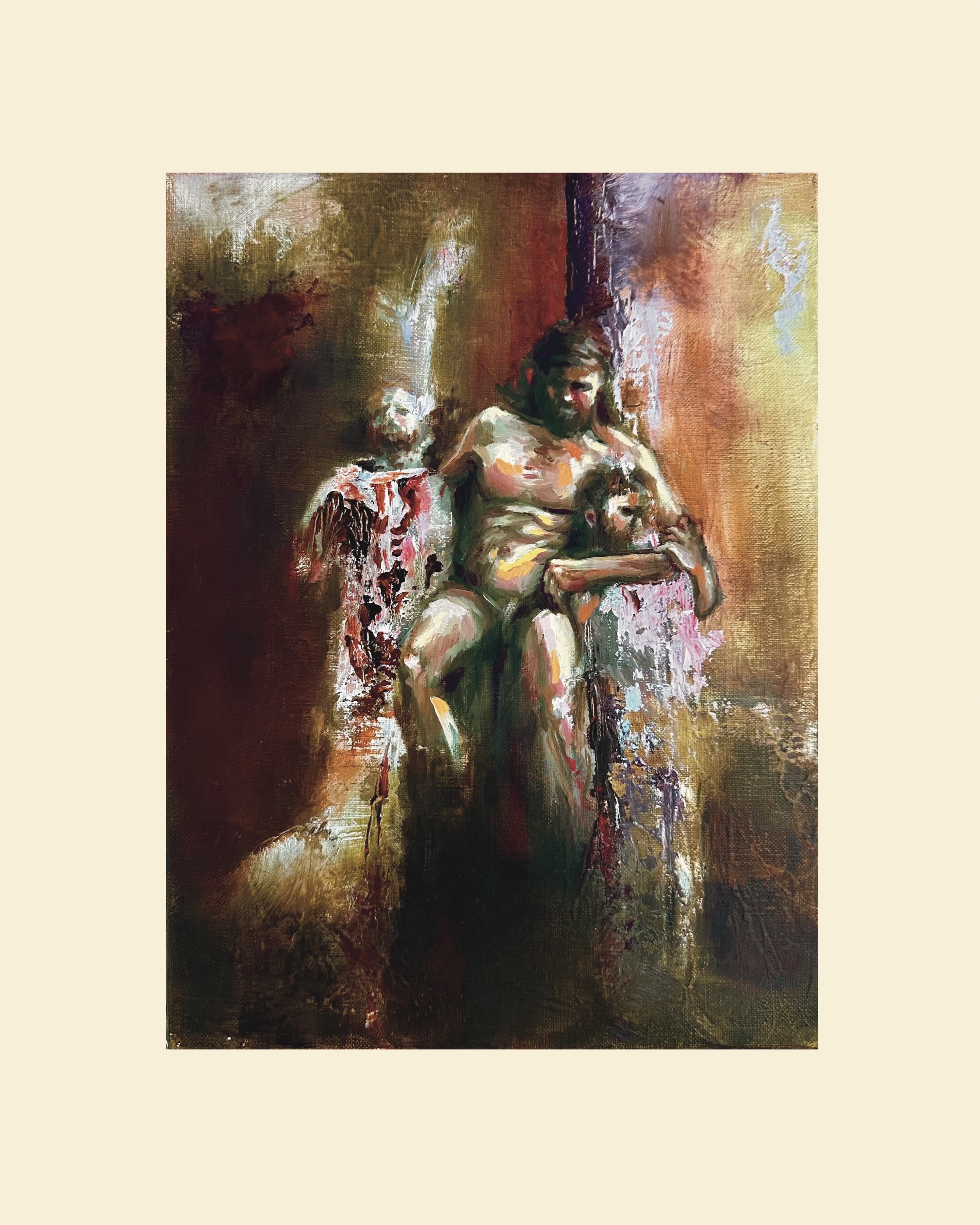

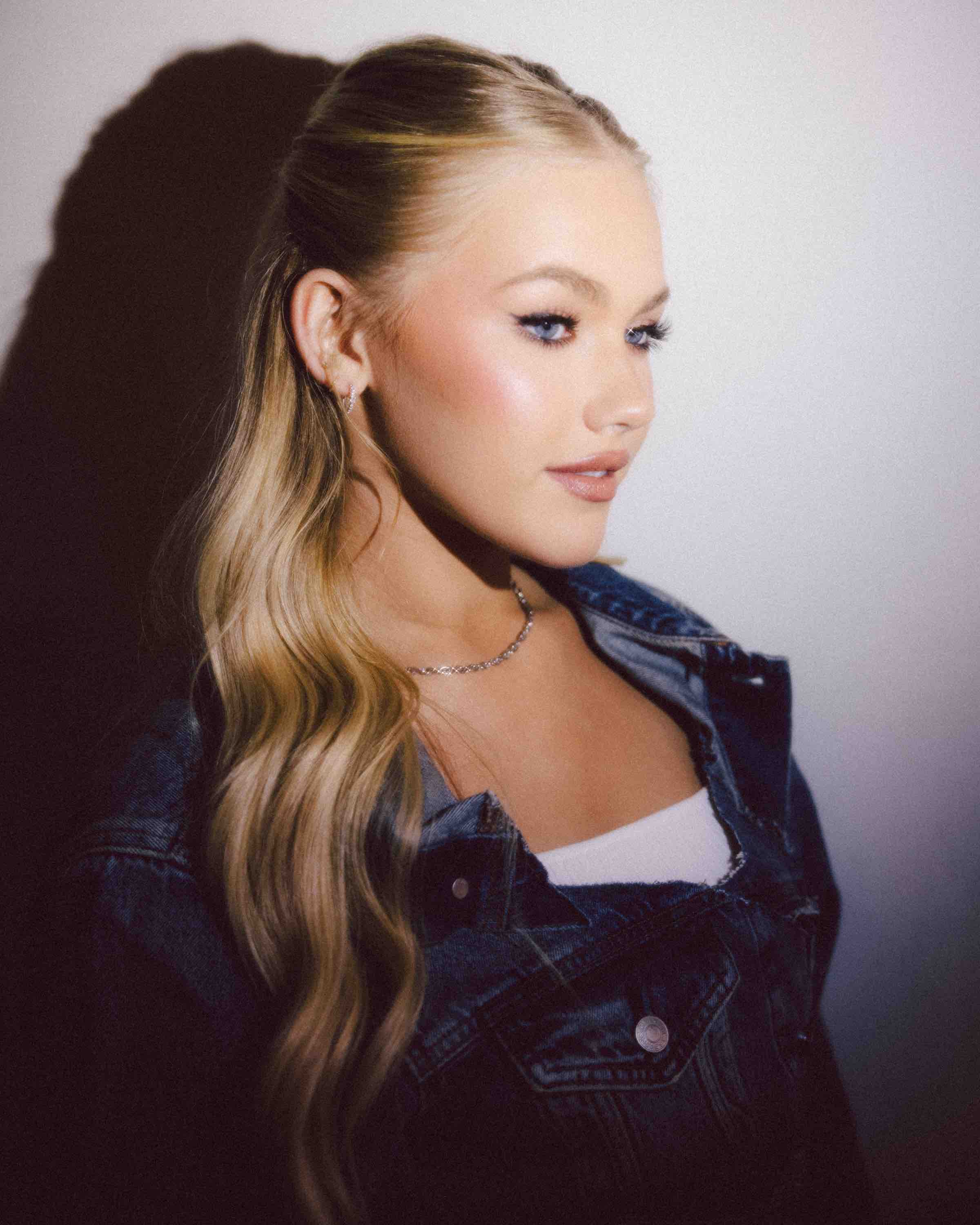
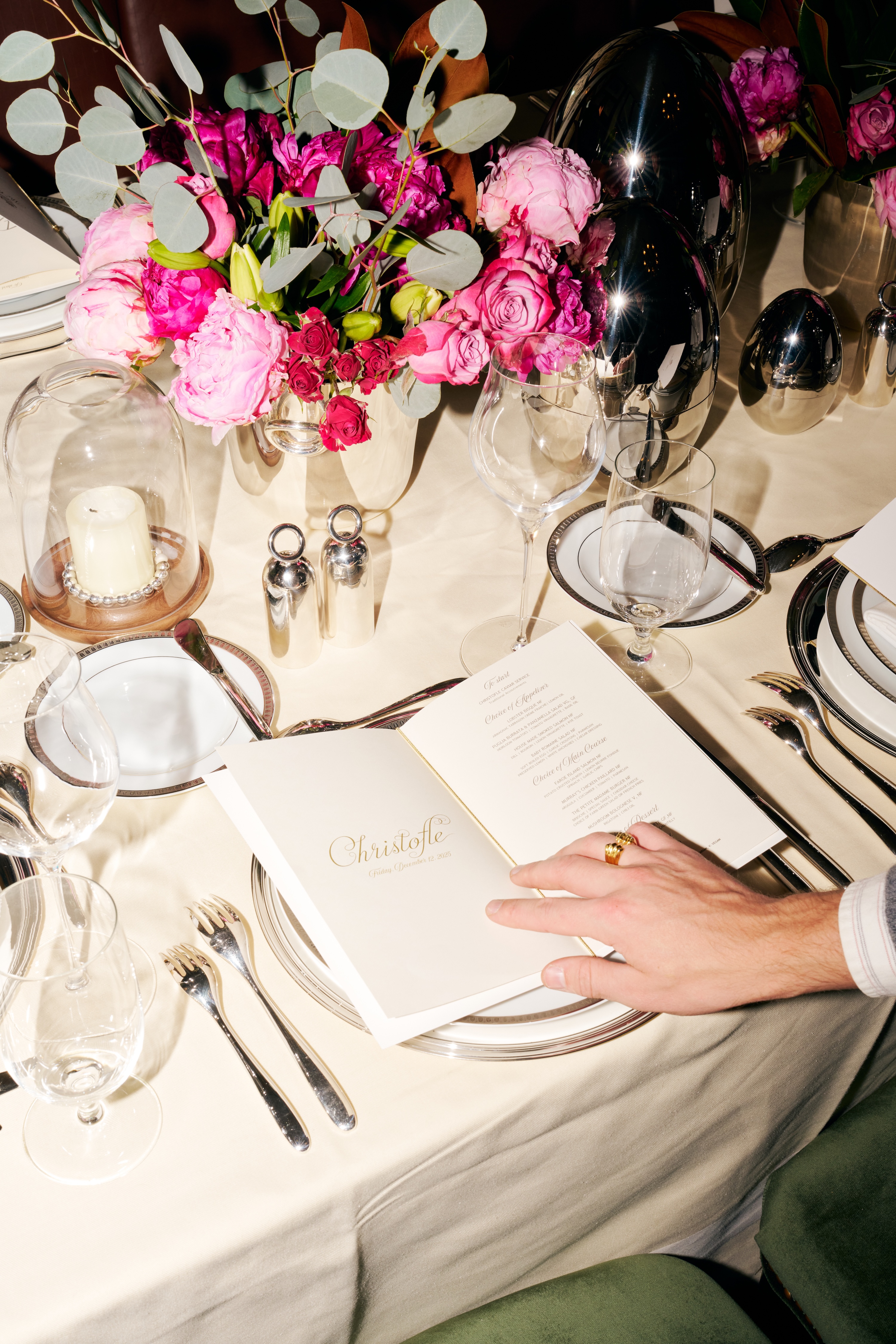

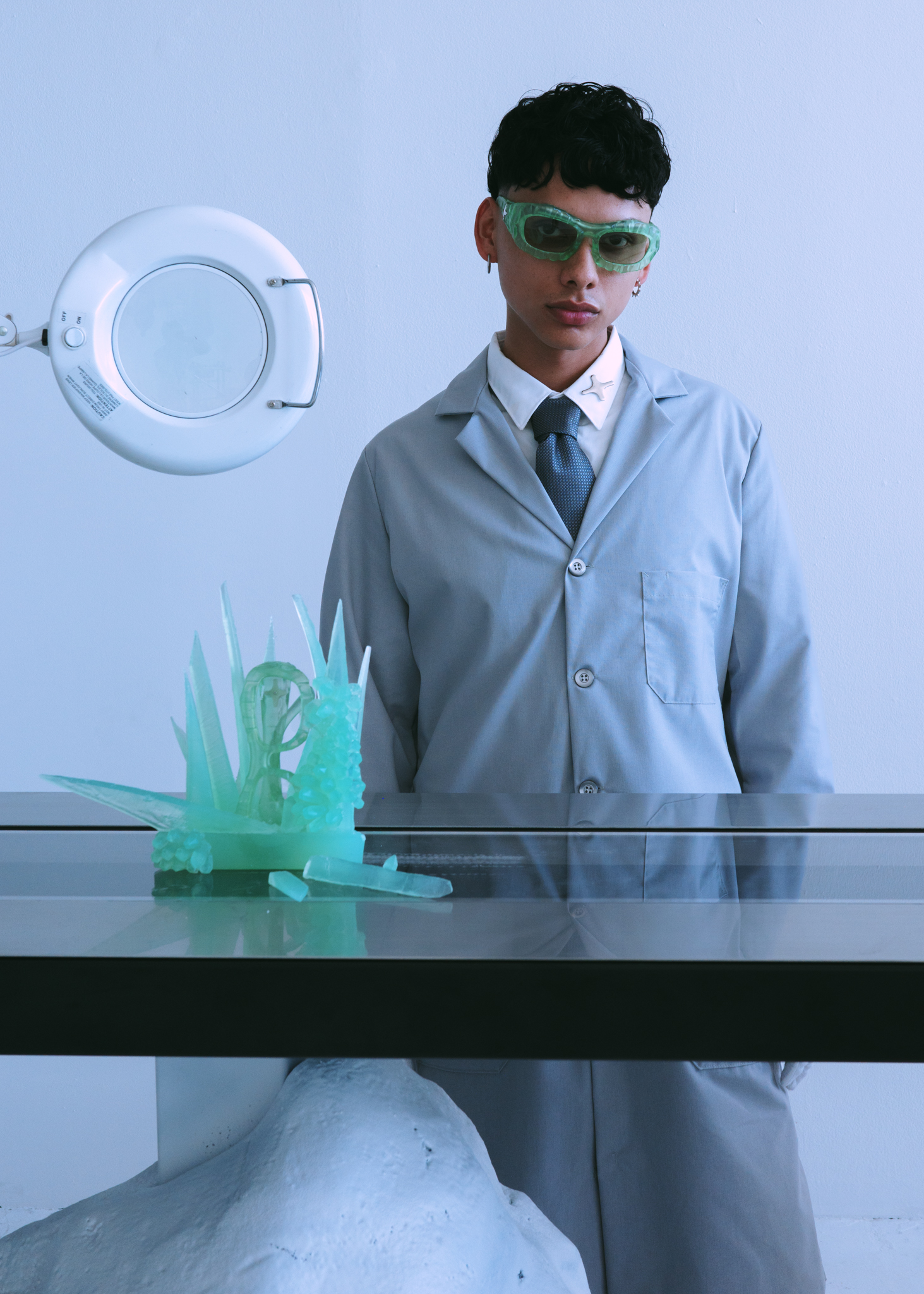
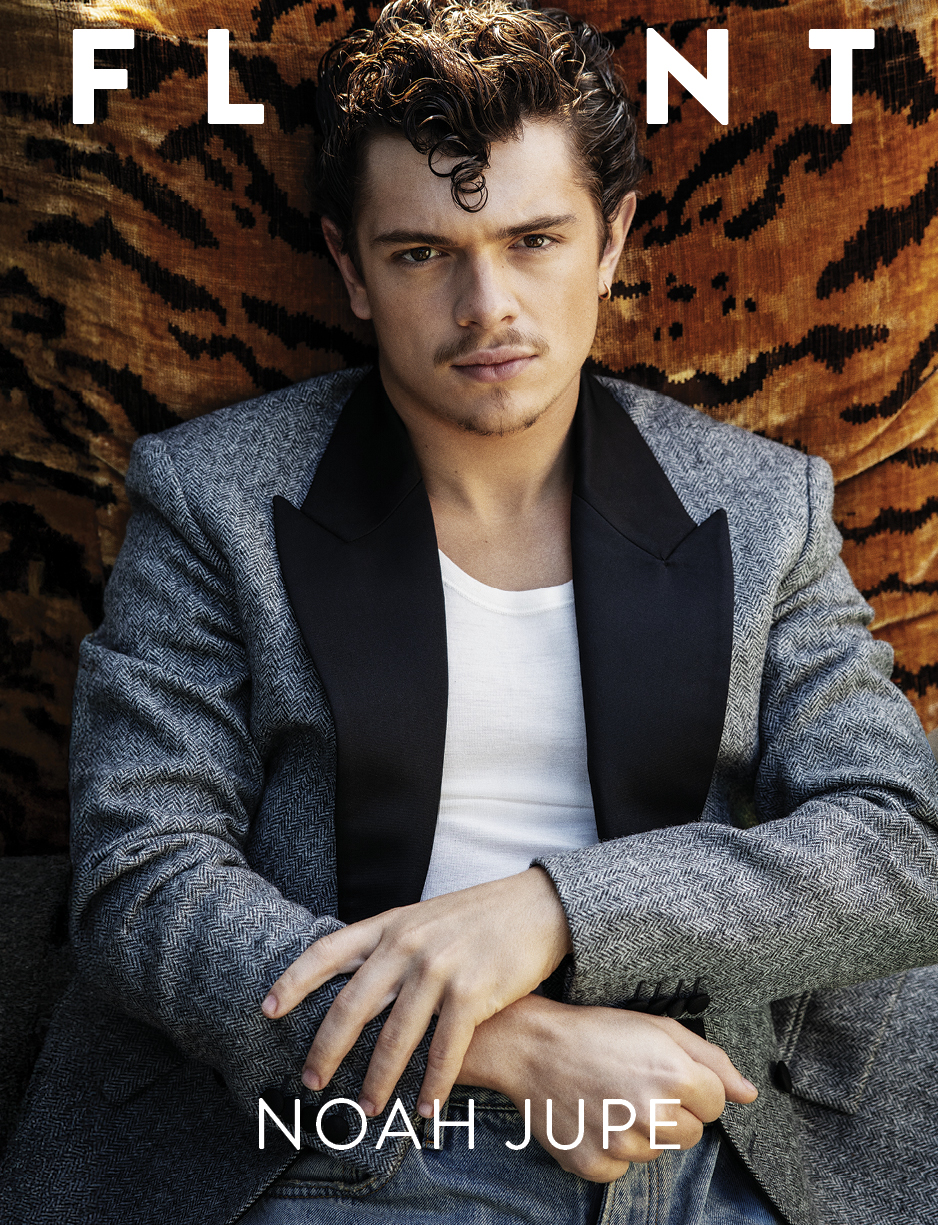


.JPG)
.jpg)

